#economy of prestige
Text
The Modern Language Association of America finally announced the winners of this year's book prizes. It's always interesting to see what the prize-winning books are because they're a decent indicator of the current direction of literary and cultural studies. Also, the winner of the de facto overall book of the year award, the James Russell Lowell Prize, taught in my old program for a few years at the beginning of his career. I never worked with him (different subfields and all that), but I talked to him a couple times, and he always struck me as a nice, smart guy. What an honor to win the James Russell Lowell. I'm very happy for him.
5 notes
·
View notes
Text
- Farmer Malleus what if where he leaves everything behind with you -
Silver and Sebek begging farmer Malleus to come back to the country and lead them.
🐊: "My king! The world is in danger! You have the might of a million soldiers. There's no one else like you. We need you-- nay, everyone needs you!"
🐉: "I am a father now. I am old. My bones are brittle. I'd wager you could topple me in one strike."
It's only been five years since their graduation. He tears off logs for their fireplace with his bare hands.
⚔️: "The kingdom is struggling! With you gone, our prestige has lost its value and our economy has completely fallen because of the remaining nobility's greed. You are irreplaceable, both as an important symbol and as a strategist for internal affairs--"
🐉: "Economics? I can't even do basic arithmetic anymore. My son is even better than me-- you should have seen how quickly he learned to count to a hundred."
He remembers how many eggs each of their chickens have laid over the course of their poultry lives. He knows exactly how many fishes swim in the river nearby.
🐉: "I only know love now, not war. I'm afraid I am no longer as influential as you remember me."
Bears are terrified of him and come by their house not to pillage for food, but to offer food out of fear that he'd obliterate them if they didn't make a ritual sacrifice to pacify him.
Oh dear, this is going to be a loooong day for Silver and Sebek.
949 notes
·
View notes
Text
Rampur, Azamgarh LS bypoll | Popularity test for BJP, battle of prestige for SP
Rampur, Azamgarh LS bypoll | Popularity test for BJP, battle of prestige for SP
Rampur, Azamgarh LS bypoll | Popularity test for BJP, battle of prestige for SP
The Congress has decided to stay away from the by-polls in both seats. The Bahujan Samaj Party (BSP) is skipping Rampur but has fielded a candidate in Azamgarh, which some believe is aimed at helping the BJP
The Congress has decided to stay away from the by-polls in both seats. The Bahujan Samaj Party (BSP) is…

View On WordPress
0 notes
Text
quarterbath - Devasa+ (2)
Quarter Bath, Turkey's bathroom product and accessory manufacturer, combines its mastery in ceramic with special designs. The company, which brings together the most stylish models of sinks, toilet bowls, urinals, bathroom cabinets and many products that come to mind, with the customer; continues production uninterrupted. Quarter Bath, which is the address of toilet bowl and similar products, stands out as a branded quality in bathroom products that are skillfully signed with special designs by making use of the latest technology. Those who see Sink mirror models want to examine it again.
Quarter, which stands out among Ceramic manufacturers in the international market, continues to be the pride of our country. The company, which follows an environmentally sensitive production policy, increases the number of employees along with its production capacity. The company, which contributes directly to the Turkish economy, both directly supports the national capital with its export side, and increases its prestige in the global arena. You can visit the website of the manufacturer of Bathroom Current to examine all the products of the company in detail. You can direct your questions from the contact numbers, or you can reach the support team by e-mail.
1K notes
·
View notes
Text
"The housewife is a nobody," says Philip Slater, and almost everyone agrees. Her work is menial labor. Even more status-degrading is the unpaid nature of her job. Few deny the economic as well as the sociological importance of housework and homemaking. Housework is part of the great infrastructure on which, as David Riesman has reminded us, the entire superstructure of the economy and the government rests. If women did not supply the services of taking care of the living arrangements of workers, industry would have to do so, as in the case of lumber camps, ships, and the military. But housewives are not in the labor force. They are not paid for the services that they perform.
The low status of the wife's work has ramifications all through her marriage. Since her husband's work is not only higher in status but usually competitive, as hers is not, and he has to meet certain clothing and grooming standards or lose his job, his needs have to be catered to. If there has to be a choice, his new suit is more important than hers. This, quite apart from whatever personal or institutional prestige his work confers, tends to put him in a position of status superiority to the wife.
Housework is a dead-end job; there is no chance of promotion. One cannot grow in it. There is a saying that passes as wit to the effect that Washington is full of talented men and the women they married when they were young. The couple who began their marriage at the same stages of their development find themselves far apart in later years. "Persons who took the initiative in seeking divorce," Nelson Foote has noted, "in explaining their experience, and likewise observers of broken marriages, speak frequently of a mate's having outgrown the other. It is the husband who usually outgrows the wife." Not only does the wife not grow, but the nonspecialized and detailed nature of housework may actually have a deteriorating effect on her mind, as Mary Roberts Coolidge observed long ago, rendering her incapable of prolonged concentration on any single task. No wonder that after hours of passive, often solitary, absorption in television and radio soap operas, she comes to seem dumb as well as dull.
-Jessie Bernard, The Future of Marriage
352 notes
·
View notes
Text

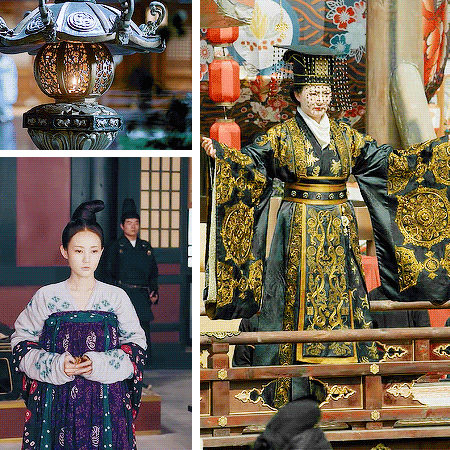
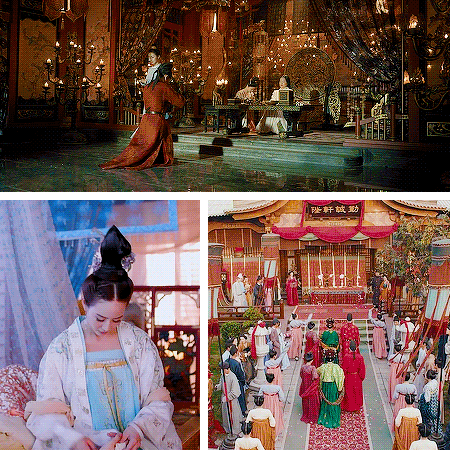


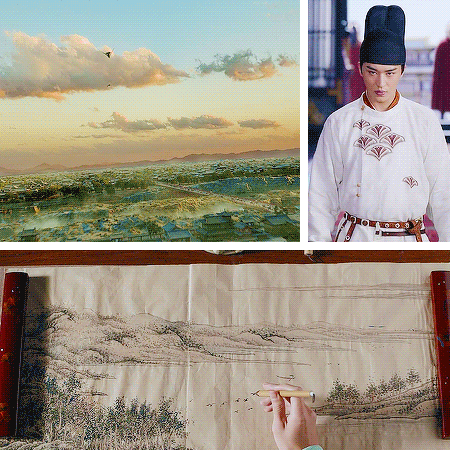


PERIODDRAMA APPRECIATION WEEK 2023
Day 4: Favorite time period/era:
Tang dynasty:
The Tang dynasty, or the Tang Empire, was an imperial dynasty of China that ruled from 618 to 907, with an interregnum between 690 and 705. Historians generally regard the Tang as a high point in Chinese civilization, and a golden age of cosmopolitan culture. The Lǐ family (李) founded the dynasty, seizing power during the decline and collapse of the Sui Empire. (source: wikipedia)
In general, garments were made from silk, wool, or linen depending on your social status and what you could afford. Furthermore, there were laws that specified what kinds of clothing could be worn by whom. The color of the clothing also indicated rank. During this period, China's power, culture, economy, and influence were thriving. As a result, women could afford to wear loose-fitting, wide-sleeved garments. Even lower-class women's robes would have sleeves four to five feet in width. (source)
Wu Zhou dynasty:
Zhou, known in historiography as the Wu Zhou was a short-lived Chinese imperial dynasty that existed between 690 and 705, when Wu Zhao (commonly known as Wu Zetian) ruled as empress regnant.
Despite Wu's infamous rise to power, there is evidence that suggests women were granted more privileges during her reign, and China was in a state of great prosperity during her rule.
Wu Zetian greatly enhanced the prestige and effectiveness of the civil service recruitment tests, filling government positions by skills demonstrated in written examinations, and opening them up to men of all classes. (source: wikipedia)
#luoyang#wind from luoyang#court lady#weaving a tale of love#the empress of china#jiu liu overlord#stand by me#cdrama#asian drama#stuff:mine#perioddramaweek2023
237 notes
·
View notes
Text

Mantaray by Dean Jeffries

Mantaray by Dean Jeffries
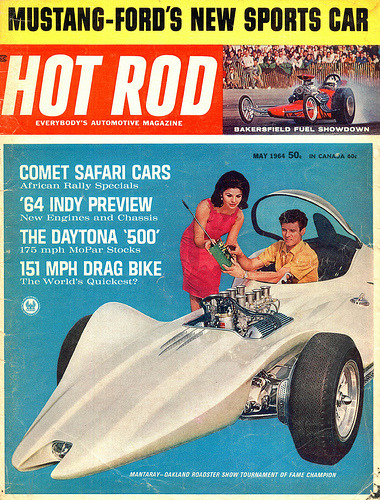
The holy grail of the hot rod generation was to be able to fabricate beautiful car bodies in steel and other materials. Many of the kids who became Hot Rod building legends had honed their fabrication skills in the hot house of the WW2 American economy. The war ended and charged-up servicemen came home and wanted the buzz of driving fast cars. It was boom time in America and everything seemed possible.
Dean Jeffries was one of this generation of brilliant mechanics and fabricators with an audacious enough vision to dream with his eyes wide open. Having worked extensively with AC Cobra creator Carroll Shelby, he began to build the Mantaray in 1963 in response to a call for submissions to a high prestige competition that had been posted by a promoter called Al Slonaker.
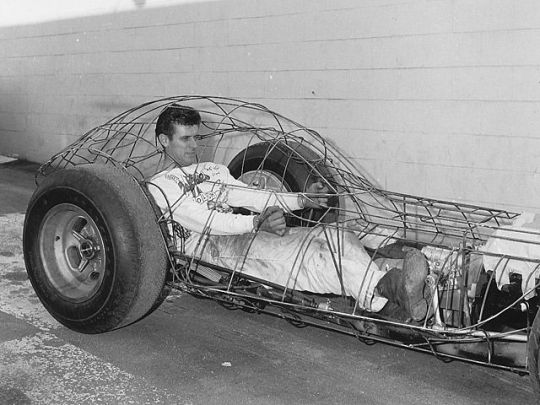
The young Californian fused two old Maserati single seater chassis he had acquired and welded them together. The suspension, brakes, and steering were kept on for the finished article but apart from four Weber carburetors, the car was, he told Street Rodder Magazine recently “true-blue American, right down to the 15-inch magnesium-cast Halibrand wheels and the bred-for-Indianapolis Goodyear Blue Streak Speedway Special tires.”
Unsurprisingly, the gorgeously curvacious body Jeffries created (which was, apparently, hand-built from no less than 86 sheets of metal), was enough to win him the ‘contest of fame’. This not only won him a prize of $10,000 and a trip to Europe, but also changed the way the world thought about Hot Rods.
This is what we call truly creative car culture. And we love it.
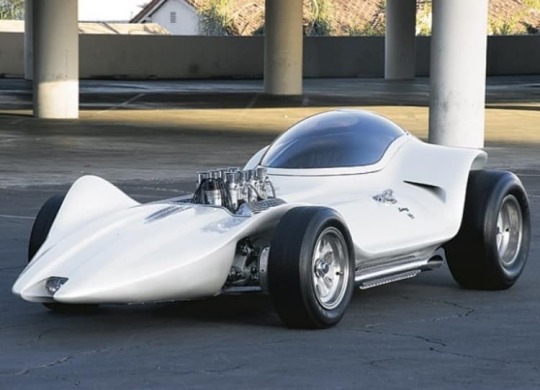
Mantaray by Dean Jeffries
50 notes
·
View notes
Text

Read about African polygamy
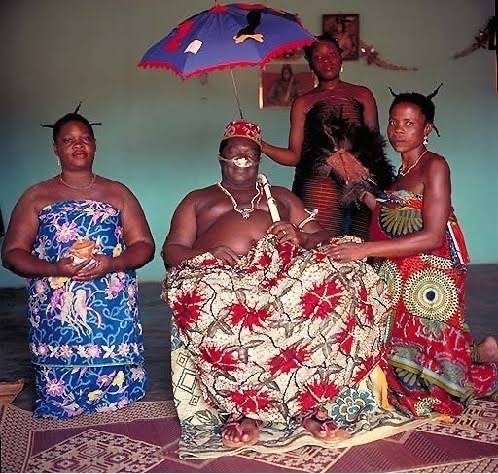
Historical Context:
Polygamy in Africa predates colonialism and is intertwined with traditional cultural practices and religious beliefs. In many African societies, polygamy was a symbol of wealth, power, and prestige, as having multiple wives signified a man's ability to provide for and protect his family. Additionally, polygamy served practical purposes such as expanding family labor forces and ensuring lineage continuation.
Polygamy, the practice of having multiple spouses simultaneously, has sparked debates and controversies around the world for centuries. While some argue that polygamy can have positive effects on individuals and communities, others condemn it as harmful and oppressive. In this article, we'll examine both sides of the argument to better understand the complexities of polygamy.
Cultural Significance:
In some African cultures, polygamy is seen as a way to strengthen family ties and social networks. It also plays a role in the distribution of labor and responsibilities within the household, with each wife often having specific duties and roles. Moreover, polygamous marriages are often accompanied by elaborate ceremonies and rituals, reinforcing social cohesion and community bonds.
Contemporary Perspectives:
While polygamy remains legal and socially accepted in many African countries, its practice has evolved in response to modernization, urbanization, and changes in societal norms. In urban areas, economic constraints and shifting gender dynamics have led to a decline in polygamous marriages, as the costs associated with maintaining multiple households become prohibitive. Moreover, women's empowerment movements and changing attitudes towards gender equality have challenged the patriarchal structures that underpin traditional polygamous unions.
Title: Debating Polygamy: Exploring the Pros and Cons of a Controversial Practice
The Case for Polygam

1. Cultural Preservation: For many societies, polygamy is deeply ingrained in cultural traditions and religious beliefs. Advocates argue that prohibiting polygamy infringes upon cultural autonomy and the right to practice one's beliefs freely.
2. Economic Benefits: In agrarian or subsistence-based economies, polygamy can provide economic advantages by expanding the labor force and increasing household productivity. Multiple spouses can contribute to farming, childcare, and other domestic tasks, thereby improving the family's overall welfare.
3. Social Stability: In some contexts, polygamy can foster social cohesion and stability by strengthening family networks and community bonds. Polygamous unions often involve extensive kinship networks, which provide social support and security for members.
4. Gender Empowerment: Contrary to popular perception, some women choose polygamous marriages willingly, viewing them as a means of financial security, social status, or companionship. In certain polygamous arrangements, women may have more autonomy and decision-making power than in monogamous marriages.
1. Gender Inequality: Critics argue that polygamy perpetuates patriarchal power structures and exacerbates gender inequality. In many polygamous societies, women have limited rights and agency, often facing discrimination, abuse, and neglect within the household.

2. Emotional and Psychological Harm: Polygamous marriages can lead to emotional strain, jealousy, and conflicts among spouses. Children in polygamous households may also experience psychological distress due to complex family dynamics and divided parental attention.
3. Legal and Ethical Concerns: Polygamy raises legal and ethical questions regarding marital rights, inheritance, and child custody. In societies where polygamy is practiced without legal regulation, individuals may be vulnerable to exploitation, coercion, and marital instability.
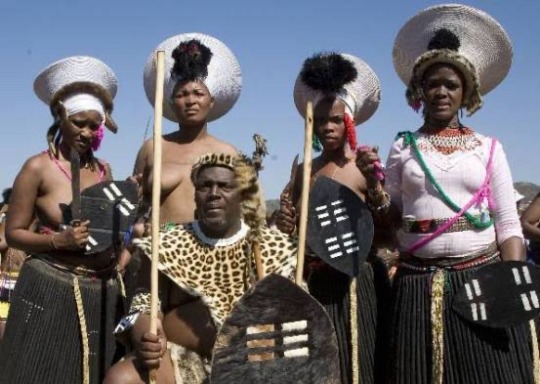
4. Health Risks: Polygamy is associated with higher rates of sexually transmitted infections (STIs) and HIV/AIDS transmission, particularly in contexts where condom use is inconsistent or taboo. Multiple sexual partners increase the risk of disease transmission, posing public health challenges in polygamous communities.
The debate over polygamy is nuanced and contentious, reflecting divergent cultural, ethical, and moral perspectives. While proponents emphasize its cultural significance and potential benefits, opponents highlight the risks of gender inequality, social harm, and health hazards associated with the practice. Ultimately, the question of whether polygamy is "good" or "bad" depends on one's values, beliefs, and the specific context in which it occurs. As societies continue to grapple with issues of gender equality, human rights, and cultural diversity, the conversation around polygamy will undoubtedly evolve.
#blackpoet#black history#polygamy#viralpost#viral trends#life#culture#animals#aesthetic#history#blm blacklivesmatter#anime and manga#architecture#black community
45 notes
·
View notes
Text

"Don't trust me?"
"I don't even know you—"
His hand lifts, metal fingers spreading lazily as he holds his palm in front of you. A peace offering. The sight of it makes you scoff.
"Fair. For what it's worth, I don't trust you much, either, but—" another inhale of his cigar. His voice is pinched when he speaks, his breath ghosting white with the smoke congealing in his lungs. "We have to make do with what we have, don't we, love?"
》 WARNINGS: allusions to political corruption, mild horror (maybe??), mentions of death and murder; more banter in a pub; Price has a past
》 WORD COUNT: 8K
》 NOTES: This was originally much longer but the second part delves heavily into the mechanics of the world (we FINALLY see MC—I'm not good at creative nicknames—go into the underground/black market and it is like, a Thing!!!!) and it felt like a bit of an overload with soooo much being revealed at once. So, I split them up. More Reader x Price in a pub. Bantering. Because, ummm, I’m so goddamn creative, lads.
SERIES MASTERLIST | PREVIOUS : NEXT
Makarov's outburst clots in the fibrils of your still reeling mind, replaying in an incessant loop that keeps you up into the early morning hours, unable to sleep.
Each time you close your eyes, you see the unavoidable truth in blood looming before you. Inner Circle. Inescapable.
All this time, you'd been under some false assumption that Makarov was the sole lender to whatever medical intervention was needed to bring you back from the clutch of death. It would make things easier.
People die every day.
It was the macabre ideal you clung to, digging into the notion until your nails cracked and bled. The only constant in your life that brought some semblance of hope.
After all, the dead can't collect any debts.
But a corporate entity can.
You're pulled out of your reverie when the sound of a news alert fills the silence of your penthouse. The screen flickers to life at the apex of dawn, just when the indigo sky above splits into a varicoloured smear of pastel pink, ochre, and lavender. The looming horizon—sun a hazy flaxen—swallows the tenebrous that gnaws on the skyscape outside of your window.
The vacuum fills the familiar jingle of your normal routine. A man sits behind a podium. The chyron below warns of a biblical rainstorm approaching, enough—
"—to wash the whole city away," the newscaster jokes as he jogs the stack of papers in front of him. A bead of sweat catches in the flushed light of the newsroom. The implants on his cheekbones flash; the chromatophore upgrade in his sleek skin shifting in a kaleidoscope of colour. "It comes at a good time, though, as reports of sickness are spreading through the medical bays. It must be flu season—," he titters before shifting his attention over to a man on the other half of the screen.
He wears a black poncho and a wide grin.
"A flu?" He echoes, the words swallowed by the passersby in the city square. The jumbotrons in the back bath him in a hazy, neon smear. "In this economy?"
They chatter in the background about a sickness spreading through the city, the storm looming closer, Atlas Corporation putting in a series of patents for some big, technological feat of engineering—Four Horseman has some steep competition this year! Atlas is the up-and-coming tech company that has new, innovative ideas and a focus on the environment!
It's the only mention of Four Horsemen Corp.
It doesn't surprise you.
Money is a powerful tool. Those who weren't already in their back pocket were quickly added, and those who couldn't be paid off were—
Enticed.
Whatever Anatoly—his primary enforcer—couldn't do, an encrypted file deep in Makarov's secured vault filled the gap.
The White Horse is a multifaceted venture. On its surface, a luxury club that caters to a specific clientele. Its exclusivity makes it desirable. People fall over themselves just for the chance to enter. The prestige alone from saying, "I've gotten an invitation," is worth more than money in the circle of the upper echelon. It's elusive. Draped in mystique.
Coveted.
They want to get in so bad, just for the sole purpose of throwing their weight around and saying they've been, that they don't stop and think about the potential dangers that lurk.
After all, a club funded by the Inner Circle and owned by Makarov—the White Horse—could hardly be dangerous.
It's not the club they have to worry about but the man who owns it. The one who has people in high positions of power froth at the mouth for a chance to attend.
It is impossible to convince a man with millions to risk his neck for someone else.
But blackmail does the trick.
From the utter silence of the media regarding this, barring a few fringe sites that are too small to bother with, you'd wager that your hard work was utilised now more than ever before.
"—pull out your umbrellas, because—"
You reach out, pressing the power key. It clicks off. The hologram darkens to sleek black.
Your face stares back at you, shaded in tenebrous. Empty. Vacant. Sometimes, you try to piece together what you might have looked like as a child, but all that surfaces is a void. Nothingness.
It isn't a mental block, but an absence of everything. Anything. A gaping hole.
You think of the missing man—Alex Keller—and something rotten gnarls between empty ribs.
Six days.
Three years.
You wonder if anyone is still looking for you now. If your face is plastered on the communication poles on some distant planet. If the uncanny likeness of you is whispered in a neighbourhood in Al Mazrah where your family mourns. Or if there is now an empty spot at a dinner table that will never be filled.
You doubt it.
Nothing ever appears in the searches. No one ever stops you when you wander down the streets, and belts out an unfamiliar name. The closest you'd come to some sense of recognition was that man. The closest you'd come to thinking finally, finally, someone knew you.
But he didn't. Doesn't.
He isn't combing the shady side of down for you, but for Alex. A missing man who's been gone for six days—long enough for the man to tear through the redlight district and force your hand to aid him in finding out where Alex had gone.
(You wonder if someone fought that hard for you.)
Ugly. Stupid.
No one is looking. Makarov assured you of this when you asked him.
You're a nobody, kitten. A stray. I picked you up off the streets and brought you back. You want your family? Well, all you have is me. Ain't that swell, kitten? What more could something like you ever hope for?
Worthless.
You're caged up like an exotic bird. A toy to be kept on the highest shelf until it's needed.
A pet. A plaything.
But Makarov's reach is everpresent. His eyes are everywhere.
You can run, and run, and run—
You should know better by now. No one touches what belongs to me.
—and he'll always find you.

You have this recurring nightmare that started a year into waking up.
Makarov's idea of avoiding the hassle of you constantly asking questions about the unfamiliar world around you was to just preemptively teach you about it all. In a single session.
Despite the hesitation from the man administering the chip that would flood your mind with knowledge of the world, he pushed for it. And really—who is going to stand up to a man who not only pays their bills, but funds a vast majority of the country?
Against all codes of ethics, you were given the chip.
There is no way of describing the pain of suddenly knowing, but it left a mental scar on your psyche, one that is fundamentally irreparable. A bruise that's always there. A sore spot in your mind as it slowly heals itself from the aftermath of information overload.
But in that knowledge, came the awakening of something else.
Something that the man touched on briefly. Your lack of implants. Cybernetics. The flesh on your body is unblemished by technology, save for a small port where your spine meets your skull. It's always been there. You woke up with it.
It is covered by a layer of tissue meant to keep debris from getting in, and most days you forget about it's existence entirely.
Until, of course, days like these.
When you remember a piece of that overwhelming puzzle that was forced into your head. Artificial intelligence. Androids.
Project Sentience.
It's now considered a cruel, awful experiment conducted by the forefathers who founded the technological epoch that bloomed, by many accounts, out of control and transformed life within a few, short decades.
The project was started with good intentions. They meant to mind the gap between the limits of knowledge and erase the blemish of human error. Where they dreamed up the impossible, the AIs were meant to fill in the missing holes in the theorems and puzzles.
Working, together, for a better future.
But there was an unseen flaw.
The sentience wasn't foolproof. The android working with the engineers thought themselves to be exactly what they were: human.
It was then that project commenced in secrecy. They led the androids to believe they were real, flesh and bone, but when the flawed aspect of the human ego (a byproduct of their tweaked code to mimic the behaviours of humans to seem more passably real) led them to declare themselves the greatest engineers of all time, it was then that human engineers made it known what they were.
It wouldn't be so bad, maybe, if they were just confined to the lab. But they weren't. They were meant to be human, and so—
They led human lives. Love, dislike. Heartbreak. Some had gotten married. Some had lobbied against AI agency.
All had thought they were human.
The ripping of the veil was a nasty one.
Their partners were ostracised. Lives ruined. Their agency was taken away from them in fear of an insurgence from the androids who were now feeling the distinctly human emotion of abject horror.
Everything they knew was culled overnight over something so disgustingly simple as human envy.
It was deemed too cruel to continue. Public outcry made it so that any android made with sentience was told they were artificial, and treated as such.
The lawing of this pulled people in different directions. Subservience. Superiority. Purist.
You think of that experiment, and then of the many markers left behind that give someone an advanced understanding of their anti-humanism. The first, naturally, being a lack of noticeable enhancements. Why would something made to be perfect need an upgrade or an implant when they can just be designed with that specific feature?
The second is a sudden awakening into cognisance.
An emptiness. Nothing. And then—
They're awake.
You think of that as you stare at yourself in the mirror, but it passes just as quickly as it came. Your attention was stolen away by flickering light overhead.
They warned of an oncoming storm, didn't they?
It draws your eye, and you watch the light recede in small bursts as it struggles through the power surge of the grid. It's a common sight. Static in the air. The taste of rain.
You've always been more attuned to the change in the weather, almost as if you could feel the building of kinetic energy buzzing across your flesh.
From the prickling goosebumps ghosting over your skin, you know it'll be a bad one. Biblical, they said.
You turn back, mind blank, sluggish. It's weird. All of this is—
The face in the mirror is not your own.
Well. No. No, it is. It's—
You.
But—
Your flesh drips. Raindrops of flesh slide down your cheeks, dripping into the porcelain basin of the sink where it hits the ceramic with a sickening splat.
(Pat, pat, pat—)
It doesn't hurt. You don't feel anything. Nothing, nothing at all—
And you should, shouldn't you? Agony over the slippage of skin falling off of your face in wet flakes until the smooth curve of metal is shown—
Metal.
Your chin dips. A mass breaks away, the ruination of Pangea, and falls into the basin with the rest until sleek gunmetal remains. Wires crossed, connected. You feel—
Nothing. You feel absolutely nothing.
Where terror should brim, you're empty. A vacuum.
(Made in his image.)
You force yourself to reel back, to fling away from the thing staring at you—the thing that can't be you, can't be, can't be, can't be—until you trip. Until you fall to the ground with a thud that you can only hear but not feel.
You know you're sitting down on the solid ground because you can feel the physical weight of gravity pushing against you, and meeting a barrier in the middle. Something stops it from sending you down, down, down.
The floor. Your fingers dig into the marble. The whine of metal across flat, recrystallised limestone meet your ears, but the breaking of your nails causes you no pain. No blood, either. Nothing. The uncapped tips of your carbon fingers leave scratches on the polished surface.
He'll kill you, you think, mechanical and distant. You ruined his floor.
It doesn't hit you the way it should. It doesn't do much of anything.
It feels like you're floating. Suspended. You can't feel the ground, or the floor, or the wall against your back. All that filters in is the knowledge that you are on a stable foundation, and not caught in a free fall.
You catch sight of yourself in the brass handle of the door.
A metal face stares back at you.
You open your mouth to scream but nothing comes out.
A blink back into wakefulness, and you're in your bed. The mattress is soft beneath your feverish body, the sheets saturated in your sweat. They cling to your skin, trapping you. You feel the weight of gravity. The solid frame of the bed keeps you up.
Your hands fly to your face, nails scratching against your skin.
—Skin. Skin.
It takes hours to calm down, and days to shake the terror of looking into a mirror.
You sit, huddled in your room, and wonder if maybe all the signs were there.
Sometimes you wish that if Makarov had really, truly, made you from scratch, he would have given you solid gold plates for skin, and diamonds for bones, so at least every pound of flesh would be worth something.
(Worthless.
You are—)

Your loyalty to Makarov is a tenuous thread, one frayed and knotted from the inherent sense of ownership he lays on you. An obligation of recompense for saving your life—something you'd never asked of him.
And so, it doesn't really feel like much of a surprise when you pull the rim of your hood low over your brow, tug your mask high up the bridge of your nose, and sneak past your guard for the evening to meet him instead.

The place he picked is known as Industrial City—so aptly named for its abundance of postmodern buildings from somewhere in the mid-to-late twenty-first century. The crumbling ruins of an archaic homage to humanity's progress now sit abandoned in a cluster of rotting steel, cracked concrete, and mouldering asbestos.
It's a haven for small-time gangs, and at one point, was thought to be the hideout of a notorious Purist leader who tried to sever the dependence on technology, and plunge the world back into a natural darkness.
(He got as far as snipping a single wire from the Grid before he was detained for terrorism.)
Bathed in an inky black, and void of the artificial neon smear of lights and LEDs, it looks almost haunting in the indigo gloam. A graveyard of the past.
There's a prevalent feeling of unwelcomeness simmering low in the air around the abandoned buildings, one that grows ever-potent as you wander past it, and down the overgrown path leading to an old warehouse on the opposite side.
Tension thickens the air. You feel it clot in your lungs. An uncanny sensation of being watched. Hunted. Your eyes skirt the row of crumbling industrial buildings, peering into the black voids of the smashed windows. Jagged cuts of glass, opaque from a thick layer of dust, grime, and the inevitable decay passage of time brings, gleam in the pale light of the moon suspended in the aether.
It's dark. Uncannily so.
The only light illuminating your path is the jaundiced glow of the moon and the buoyant flicker of the shuttles docking on the station. An infinitesimal dot against Tycho's vast, grey dip. Barely enough to make a difference in a place that leaks a palpable sense of unwelcomeness from the tenebrous surrounding you.
Something shifts in your periphery. Your eyes dart to a third-story window of a vacant building.
The stark, unfathomable blackness gives nothing away but you still feel the unmistakable sense of something, someone, glaring back into your eyes. Eye contact from the void.
Your gaze drops to the underbrush.
The static in the air grazes your skin. You're being watched. Stalked. Hunted.
In the furze, you make out a depression in the dirt. Oval-shaped. Plain.
It's a footprint.
It rained all morning—a small appetiser to the biblical flood they promised: a looming thundercloud inched closer to the city each day—but the print in the wet ground was undisturbed. Fresh.
Above it, you find another. And another. Another. Until it disappears between a bottleneck of the two buildings.
The path leads you back to the broken window—to the vat of black.
The mini-gyrojet you stole from Yuri a long time ago sits heavy in the waistband of your trousers. Barely the size of your hand, and certainly less potent, but the laser is just as deadly as its parent. Comforting, almost.
Your fingers twitch. You stifle the urge to grab it, and force yourself to turn around. Back to the enemy. Stupid. You know better.
But whatever is looming in the shadows isn't a concern of yours.
(And maybe, maybe, if they did shoot you in the back, you'd know once and for all what your insides were made of.)
Stupid.
Nails bite into the soft skin of your palm leaving a crescent indent against your lifeline. The flash of pain, of discomfort, quells the knot in your stomach, the one that curls tight around your organs, and claws its way up your esophagus. Fear. Anxiety. They pollute inside of you with each step through the industrial mausoleum and toward the dilapidated building in the distance.
An old parking lot sits to your right. The cracked concrete is barely visible under the thick overgrowth that congeals around the space left behind. Nature reclaiming Her land. Against the hazy ochre smear in the distant horizon, slowly being consumed by the vat of indigo that follows swiftly behind it, the tangled vines of emerald green look ethereal in the gloam.
It's a vivid glimpse into the past when this place meant something to the people who ventured here. Office buildings. A parking lot where archaic vehicles using gasoline to run once sat, wheels on the concrete. Feet on the ground. They wandered to the buildings—just another cog in the machine.
You wonder sometimes what they would think if they could see the world today. The broken line between fantasy and reality where slipping a chip into their brain stem could create a gap in time, one that lets them wander through any period of history, any memory inside their head.
They called it virtual reality.
Another plane of existence they hadn't the technology to exploit fully. A digital dimension that lingered between the layered worlds.
Some live inside that realm exclusively, refusing to risk themselves in the physical plane where an errant jet could end their lives.
It's a strange juxtaposition from that to this. Where the graffiti that stains the crumbling ashlar is now considered with reverence to this world as a handprint in a cave was to that one.
A noise echoes through the vacant lot. The sound of a cut-off shout. Your eyes dart to the left, taking in the sight of two men standing outside of a Burger Town, jostling each other over the last jetbike parked in the charging dock.
Inside the restaurant, a man leans against the tinted glass, cigarette in his hand, watching the same tousle as you. Under the flickering neon sign, his lips quirk up in amusement when one of the men loses their balance, tumbling to the pavement.
It's another odd juxtaposition. A rotting graveyard of the past, some buildings salvaged and converted into a strange array of low-brow pubs, and—
Neon lips open, a pink tongue glides over the plump line of red before disappearing into a closed-mouth smile. It repeats.
—a pseudo redlight district for those who can't afford the rent on the main boardwalk.
The graffiti on the wall of the building is faded. The paint peeling, and weathered from the passage of elements. But you can still make out the shape of a yellow dick on the wall.
Bars. Fast-food. Sex. Testosterone.
The world might be different, but the people certainly aren't.
You pull your hood down lower over your brow, and quickly keep moving.

The converted warehouse doesn't have any markings on the outside to identify it as a pub, and you almost miss it until your tracker chimes, indicating your arrival.
Upon first glance, it's just a long, rectangular two-storey building made of chipped burgundy brick and scattered windows, all crusted with grime until it's tinted in a thick, opaque grey.
You check the map again—just once to be sure—and send off a delayed alert with a timer set to go off an hour from now to Yuri.
If you don't turn it off before the time runs out, he'll know where to find you.
(Or whatever is left of you.)
Everything about this, in hindsight, is pretty dangerous. Meeting a man who slings accusations at your saviour, and somehow knows about you, about your debt, in a graveyard that reeks of mildew and wet concrete is something people will hear about in passing, and wish you ill in the afterlife for being so stupid.
But you're here.
The choice has been made—whether or not it's a smart one has yet to be determined.
Military. They have power. Influence. However pantomime it might be in the face of overwhelming wealth, it's still something. You thought they were all corrupted by the Inner Circle's clandestine whispers of affluence—sign here, Colonel, and we can give you armour and weapons beyond anything you'd ever seen before (just look the other way while we sell the antis to your enemies—can't let you get too powerful, after all). It seemed like they were. The parade of men and women who congregated at White Horse, or any of the other subsidiaries around the city, the world, was a testament to that.
But he seems different.
(And really, you've always had a thing for gruff men who'll disappoint you in the end.
The heartbreak always tastes sweeter when they're worth something.)
You glance down at the screen, staring at the timer as if it was your last lifeline, and hope, desperately, that you have.
Your finger lifts. The screen fades to black. The white emblem of Four Horsemen Corp., gazes, almost accusatory, back at you.
(If anything, Makarov will kill you before the man has any chance of breaking your heart.)
Turning back now is forfeiture, weakness.
And you'd rather not walk through the graveyard again.
The door is made of rusted metal, and whines loud enough to echo through the barren landscape when you push it against the hinges. Muted gold leaks through the crack, spilling out onto the dirty pavement below your feet. Light catches on the motes dancing in the beam, and cuts through the murk of the falling night.
Inside, you hear the fading tune of an old song playing out its last chorus. The scrape of a mug being pulled across wood. A low murmur. And nothing else.
The normalcy of everything so far—or as normal as a strange retro pub in the middle of a mouldering neighbourhood could be—goes against the theatrics Makarov likes to pull, and you know from that alone that if this was somehow a trap, it wasn't his design.
Anatoly would be jeering at you from the very top of Makarov's tower, fingers pushing against your shoulders until you were forced further back with each question you didn't answer. All the way to the ledge, where Makarov would intervene—always wanting to play the part of a saviour—and spare you.
Just answer me this, kitten, and I'll put an end to it all.
But the moment you opened your big, stupid mouth and gave him what you wanted, he'd begin monologuing by the sidelines, pacing as he speaks, until—
Well. We can't all be heroes. Sometimes, we need to be knocked down a peg. Anatoly would move closer, oblivious to your pleading demands for leniency, and Makarov would smile, sharp and shark-like, and say, as if it pained him: or a few stories.
And you'd fall. Three hundred floors to your death.
By the time you hit the pavement, you'd be a wet puddle of mush. Unidentifiable. They'd ensure it by removing your identity chip, and anything else that would give the mess of your remains a name.
You've seen it play out enough times to know how it goes. The script might bend to fit the needs of the accused, but the plot was always the same.
Theatrical. Dramatic.
Your fingers curl into fists by your side, and find some solace in the fact that a two-floor drop probably won't kill you.
This is survivable as long as you're useful.
A new mantra is craved in the recesses of your mind. Useful. Useful.
You repeat it to yourself as you pull the door open wider, glancing in the room warily. Hesitant.
Whatever you expected, this wasn't it.
It's normal. Archaic in design.
Lanterns are strung across the rafters crisscrossing the ceiling, bathing the small room in a muted gold. It complements the raw topaz colour of the wooden decor inside—herringbone floors, shiplap-covered walls, dark spruce tables and benches—and something about it all feels almost homey. Comfortable.
The size and cut of it err into intimacy or claustrophobia, and you wonder if that's why he picked it.
On the opposite side of the entrance is a dark hallway. A flickering exit sign glows softly in the gloom. Two darker doorways branch off on either side of the back door. Washrooms. You can vaguely make out the light spilling from the insignia etched into the wood.
It's flush against the rightmost wall where a series of old photographs sit, crookedly, on the panels. The images are too faded, jaundiced from time, for you to make out the shapes, but they all look human. Humanity from a bygone era. You catch sight of an old aeroplane, the vessel barely longer than the height of the man standing in front of the large propellers.
The rest of them are of people standing together near old landmarks that no longer exist.
Metals line the interior of one, kept guarded behind a new protective seal. They shine in the soft glow, and the label beneath reads: chest candy.
These are personal photos. Family heirlooms. Staring at them, struggling to make out the full shapes of the children, the men, and the women, standing around and smiling happily make you feel a touch voyeuristic. Gazing into a tomb not meant for your eyes.
You pull away from the wall, glancing at the one that sections off the washrooms from the main room. It, too, is decorated in photographs, but these ones are less personal. Images of long-gone celebrities. Artistic renditions of landscapes that evolved over the last centuries into something new, something different.
The theme of the wall is aerial. You make out old etchings of aircraft in all sizes. Commemorative pieces. Militaristic in its design.
Three booths sit flush against the wall, all made of dark wood, and each seat empty.
Against the leftmost wall is the bar itself, separated from the seating area by a long, oak countertop with six bar stools pushed up close. A mug sits, half-empty, in front of one. An empty glass in front of the other beside it. An ashtray in the middle of the two seats, filled with cigarette butts. One still burns away, wheedling down to a snubbed point.
The wall is lined with bottles. A tap behind it. At the end is another doorway which must lead to the back area. The sign above says employees only.
Near the only window in the room is where you find a solitary table with three chairs. In the seat facing you, back angled between the cut of the walls, shoulder turned to the bar, is where you find the man. Watching you.
A glass rests in front of him, half-empty. A burning cigar in an ashtray curls wisps of smoke over his face.
The implant in his eye glows sapphire blue, expanding as he reads the information in front of him. The other is darkened under the flushed light, almost black. Gazing right at you.
It's a contrast that makes you shiver.
"Made the right choice then," he says, words low as he lets them fade under the steady cadence of the song playing somewhere in the back of the bar.
It isn't much of a perfunctory greeting, but you take the opening all the same, and make your way toward him.
"That's yet to be determined."
"You're still here."
The wood is warm under your palms when you press them against the grain, shuffling into the bench across from him. Warm, and sticky.
You peel your fingers off, glancing at them warily. "Not much of a choice, though—" your eyes find him, narrowing into slits when he snorts, shaking his head at the disgust in your gaze. "What's so funny?"
He huffs and the blue light flickers out, fading into dark blue. "You," he offers as if it was obvious. The condescension bleeds from his lips when he speaks, and leaks into his clear eyes when you fold your hands into your lap. "Not the kinda place Makarov normally takes you, hmm? Ain't you spoiled."
"Makarov doesn't take me anywhere."
"That so? What? You his dirty little secret?"
Your brow furrows. "What's that supposed to mean?"
"Nothin', love. Nothin' at all."
He's baiting you. The condescending draw of his voice, thick with derision, sets your teeth on edge, and makes the knots in your stomach tighten.
"Look," you start, sticky fists cleaned tight in your lap, irritating the indents in your flesh from earlier. It's enough to ground you. "I didn't come here for games. This is my head on the line, and—"
"Mine, too."
You scoff. "You started this."
"And it's my men who are out there, yeah?"
He leans forward slowly, the wrinkles in his brow deepening under the hazy glow until all you see is darkness cascading over a rucked canyon. Anger pinches at the corner of his eyes, the near snarl of his mouth.
He'd go for the jugular, you think. Sink his teeth into your flesh until a pound is ripped out, reaping his dues.
You wonder if his fury is as animalistic as the teeth he bares in anger, in warning.
"Gettin' injured, killed. Goin' missin'. Fighting a battle your men are waging."
"Makarov isn't waging anything. You don't know much about him, do you? The only thing he cares about is his stocks and his public image. Whatever you think he's doing, or he's behind, I can assure you—he isn't."
"You sound certain. What, hmm? Ain't the kinda pillow talk he likes to indulge in?"
"Pillow talk?" His words make you reel back until you're flushed against the chair, eyes widening. "I think there's a massive misunderstanding here."
He says nothing, merely opting to reach for his forgotten glass of scotch and dwindling cigar.
Pillow talk. "You think me and Makarov are—? No. No! That's—" you fight a shiver of disgust, knuckles digging into your thighs. "No. Makarov wouldn't—it's not like that. He's—"
"He's what?" He implores, resting his elbow on the countertop, cigar dangling dangerously between his lax fingers. The look in his eye is sharp, keen.
"He's my—"
You bite your tongue suddenly, stopping the familiar words from slipping out. It's the response you give when people ask what you are to Makarov—why he keeps you around on such a short leash.
My saviour.
The words have different connotations inside Makarov's sprawling skyline palace. Where his guards simply nod, in understanding, and accept your words as is, because he, too, is theirs as well. A common ground where nothing else needs to be explained as one word covers everything.
You won't find that here. Not with him. And maybe, maybe, some part of you is shying away in shame over the word. Saviour. You sound like the zealots running around proclaiming they heard god whispering to them in the grid, and felt Its holy touch when they plugged something in.
Electric, they say, reverently. Our saviour is stuck inside the machine—!
(You wonder, now, if Makarov chose that particular word on purpose, and know, immediately, that he did.)
"I owe him money. Why wouldn't he keep me around with such a staggering debt?"
Bringing it up gives you the opportunity you need to shift the conversation away from the game of Messiah and Disciples Makarov likes to play, and you knot your trembling fingers together tightly in your lap.
"Speaking of—" you huff, gaze fixed on him. Taking everything in. You might not have the same implant that he does, one that allows him access to the net in an instant, and feeds it right to his cerebrum, but you've always been good at reading people. Catching their tells. "Makarov isn't the one my debt is owed to. It's the Inner Circle. Still think you can erase it?"
He hesitates. Briefly, almost indecipherably, but you catch the dip of his cigar when his body tenses, fingers tightening too quickly on the stem. It twitches only once before he steadies it. His eyes cut to yours, impassive and unreadable, as he takes in the information you just offered.
The Inner Circle banking division was notorious for having contracts upon contracts to avoid buyouts without some hefty fee attached to make up for the lost interest.
It's a roadblock. Almost everyone you've met so far, ones with idealistic dreams of stealing you away from the clutch of Makarov, bulked at the number alone. This, this new piece of information, was bound to make him flee. Cut ties. Run.
Another hero with too much on his shoulders to bear another burden, leaving you behind to rot.
Tough luck, kid, one of them said after a three-week-long courting period that left you feeling moon swept and dizzy. Wide-eyed and jejune. Naïve little kitten, Makarov taunted the morning after you found yourself alone on the dock, bags packed, waiting for a man who'd never show. But Makarov met you there. Yuri, with sorrowful eyes, took the bags gently from your trembling hands, downcast as he murmured in your ear, you'll be okay, kitten.
Anatoly's biting laughter haunted you for months. Christ, he howled. You really thought there was a man on earth more powerful than Makarov? Damn, he swindled you good, dumbass. Was he at least a good fuck? I'd be so goddamn pissed if this happened to me and the idiot was lousy in bed.
But it was Makarov's palm against your cheek that broke you the most. The icy eyes never softened despite the coo of sympathy in his voice.
It hurts, doesn't it, kitten? Who knows if this is your first heartbreak, but I'm sure it feels like it is, doesn't it? Ahhh, You should know better by now. No one touches what belongs to me.
"Now about this betrayal…"
He had you locked in your flat for months, and everything iota of your time monitored in some capacity. The leash was shortened. The collar tightened.
The punishment for your betrayal came weeks after, when a package arrived at your flat. A golden box weighed down with precious gems and metals.
A holographic card popped up when you opened the package, hands shaking around the heavy box.
Makarov's voice flooded the room. What's more precious than gold and diamonds? The latch on the box clicked. You lifted the lid. At first, it didn't make sense. Your mind blanked, wiped, as you struggled to figure out what it was you were staring at.
A heart, kitten. His heart.
Then—
Horror. Stomach-churn terror.
Your hands snapped back, and the box dropped to the floor as mocking laughter met your ears, static and faded over the recording.
The still-beating heart tumbled out, connected to an array of small wires that kept it alive without a host. Without—
Your hand pressed against your lips as you fought the bile rising from your throat.
Betray me again, he said, and I'll make you cut it out next time.
You stare at the man across from you and know that the wishfulness inside of you will soften his flaws, blur his lies until anything he says just sounds right. A dangerous precipice. The yearning knotting around your mouldering ribcage is hungry. Wanting.
He'll ruin you. And you'll be forced to ruin him. To carve his heart out as Makarov keeps him alive the whole time. The last thing he'll ever see would be you holding his still-beating heart before Makarov makes you crush it between your trembling, bloodied fingers.
The image surfaces—horrific, garish, gut-wrenching—and you wish you were a little more jaded, a little less idealistic, to have that alone snuff the last vestiges of hope from your rotting heart.
"Doesn't change anything," he grouses, and then brings the glass to his lips. He downs the scotch in two swallows, and you can't pull your wide eyes away from the way his throat bobs, and stretches, as he tilts his head back.
When he's finished, he huffs. The glass hits the countertop with a clang that seems to shake something inside of you.
"They're all rotten," he snarls, words a rough rasp that makes you shiver. "All of 'em. Rotten to the fuckin' core."
The corruption never surprised you. Maybe the exposure to it all, feeding Makarov the names of the politicians and diplomats that wanderers through the club's door numbed you to it all, but seeing his visceral disgust over it makes something swell inside of you.
He's not too different from the heroes you've met, the ones you read about, but where they cut their anger into pieces of understanding and compassion, he wields his like a claymore. A battle-ready man brimming with a fury that leaks from his marrow and into the icy blue of his steel gaze.
He doesn't give you kind smiles or false promises. No, he gives you third-degree burns on your flesh from the molten heat of his rage.
"Who are you?" You demand, the words slipping out before you can chomp them down. "And why do you think I can help you?"
It doesn't make sense, not really.
The look he levels at you knocks the air from your lungs.
Fear curls in your gut. Wariness. The urge to flee wells, and you just barely manage to push it down.
"I told you already, didn't I?" He leans closer, drawing the cigar to his lips. "Heard about you, 'bout your debt."
"Yeah, and you thought I was Makarov's—lover—;" the word nearly makes you recoil. "But I'm not. He tells me nothing. Still so certain I can help?"
He takes a drag of the cigar, the tip burning through the dim interior of the empty pub. His eyes never waver from yours, but you know that this piece of information must, in some way, change things. He sought you out specifically because of your assumed relationship with Makarov. The precariousness of your debt has doubled into not just an inconvenience, but a legal issue with extra fees added.
You're more trouble than whatever you might be able to weasel out of Makarov.
More trouble than your worth.
The smoke curls in front of him like a hazy shroud of white. The light catches the indent in his cheekbone, and down the side of his face where his implant sits, humming with kinetic energy even while unlit.
Without the beanie on his head, you can make out more of the circular insignia on his temple, but the crest is unfamiliar to you. Unknown. You've never seen it before, and that unnerves you.
You know all the clubs, the crests, the gangs that roam the streets. From the upper echelon of the Shepherd family to the 54 Immortals seizing the power gap left behind by the fall of Brakov in a neighbouring country. It comes with knowing the underground. With making friends in the shadows.
But this one escapes you.
He shifts, moving the cigar from his lips. A waterfall of smoke rumbles from his mouth when he breathes out.
"Yes," he says, pinched from lingering smoke in his lungs. "I do."
"How?"
"Told you, love. Heard 'bout you—from many sources."
The back of your neck prickles under his reproachful stare. Something in those cerulean depths makes you tense.
"From who?"
His metal knuckles clink against the glass when he nudges it out of the way, resting his forearm down on the wood, bringing himself closer to you. With your spine flush against the back of the chair, there is nowhere to run. It hits you, then, when he draws himself into the scant space separating the two of you, angling himself until he takes up the entirety of your periphery, that this was intentional.
Of course, it was. Of course.
"Oh, from lot's a'people a lil' thing like you shouldn't be hangin' around." Despite the derision in his voice, his brows lift, arching high until his forehead wrinkles, and you catch something that seems almost impressed when he dips his chin, staring at you from down his nose. "You get places most can't. That's useful."
"Useful enough to wipe a debt? How do I know you're good for it, and this isn't some scam?"
"You don't," he answers simply, and something snaps inside you.
"Are you joking—? Do you have any idea what Makarov will do to me, and you can't even give me some—"
"Like I told you, I know people in high places." He shrugs like it's nothing. Like it isn't your life in balance. "They want to remain anonymous, but can settle your debt."
"How?"
"Don't trust me?"
"I don't even know you—"
His hand lifts, metal fingers spreading lazily as he holds his palm in front of you. A peace offering. The sight of it makes you scoff.
"Fair. For what it's worth, I don't trust you much, either, but—" another inhale of his cigar. His voice is pinched when he speaks, his breath ghosting white with the smoke congealing in his lungs. "We have to make do with what we have, don't we?"
It isn't fair. It isn't right. A part of you wants to rebel, to grab the cigar and crush it under the heel of your palm. The anger wells inside of you, white-hot and aching, and brings with it the strong urge to scream yourself hoarse.
You believed him—if only for a moment, for a single second, but it was long enough for the vestiges of hope to claw their way up the prison you kept it in, and leak back into your marrow. A pollutant that wrecks you viciously.
But—
Maybe you expected this. It doesn't sting as much as you thought it would. He's never really committed, and said—
"But," he continues, and you wish he would shut up, shut up, shut up, shut—
"I promise it'll go away once we're done, yeah?"
Fuck.
Your voice wobbles when you speak, soundly dangerously thick, and wet. You peer up at him and wish with everything inside of you, there wasn't a thin veil of tears gathering across your lash line. Weak. You haven't cried in two years—
(You look so cute when you cry, kitten—)
"You promise, huh?"
He lifts his hand to his temple and taps his index and middle finger against the strange insignia implanted there. The hard metal of the crest meeting the soft polymer cover of his fingertips makes a muted thud not at all dissimilar to your beating heart.
"On my family name, I swear it."
Why—
To go so far for someone he barely knows, and doesn't trust—
And then it clicks. It isn't about you at all, but some personal vendetta, a promise to himself, that he'll accomplish what he sets out to do, and so, making this little oath with an outsider, the pet of the enemy, is nothing to him. It's performative as much as it is sincere, and the warring contrast makes your chest ache, and heat bloom under your skin.
"You—;" you start, but stop yourself.
He's not at all unlike the heroes you've read about in fantastical stories or the ones you'd met. The one whose heart you held in your trembling fingers as it slowly stopped pulsing in the palm of your hand. Whose blood you scoured from your skin until it was raw.
But where they offered a smile at the end of the promise they swore they'd keep, he frowns.
He doesn't strike you as the type of man to go out of his way to make others feel better. He believes in himself, and his prowess, and speaks about that in clipped, gruff declarations that are not meant to sway, but reinforce what he knows.
He will win. This isn't a question or a belief, but a statement. A truism.
Hope surges. The levee cracks.
"Who are you?" You ask, dazed.
The man who cupped your cheek, and whispered to you about escaping the clutches of this festering city, of going so far away, that grasping hands could never reach you, and greedy fingers would never again touch your flesh, didn't fill you with this same sense of awe, of pure belief in the words he said. But this man, this man, makes you feel like anything is possible. Hope blooms, brims bright inside of your chest like an inflating balloon drifting up to the heavens—
His mental hand splays flat over the table. "Names John Price."
The man sitting across from you is someone you know.
It makes sense, then. The insignia on his temple is the Price family emblem—a conglomerate in its own right, mostly composed of military men with staunch, unflinching moral codes. The incorruptible. The untouchables.
They were the ones who led the counterattack on the coup that changed the political landscape from the Feudalistic tyranny of the past, to—
Well. It was meant to be free reign, or maybe democratic, but the technological boom a few years after the liberation from the iron fist made little things slip by as the world was suddenly painted a lovely shade of roseate. Why worry about mega corporations becoming richer than most of the governmental bodies, and countries, when they made this new piece of cybernetics that let you see like a hawk, that introduced a new colour spectrum to the general public, when sickness, injury, and even death itself came something that could be bartered over for the right price.
The things that they let slip stacked up. It piled higher and higher until the free future the Price family, among others—Laswell, Shepherd, Walker, MacTavish—foresaw was smothered out in favour of the blatant mega capitalism that rules.
It might not be with an iron fist, but it is with a monetary chokehold that always seems to get tighter.
Their legacy is one founded on a strong moral core that is unbendable.
It makes sense why you didn't recognise the emblem at first.
The last of their pristine lineage—tarnished.
The man responsible for the power gap left behind by Brakov. The one who threatens his superiors, and uses brute force to get his way. John Price—the one who gave into temptation and was ousted from his family, and from the military, for taking bribes from people in low places. A man who'd side with anyone—for the right price.
Political turmoil and espionage must run in the family, then, as you somehow find yourself sitting across from the man implicated in a failed coup. One that resulted in the collapse of Urzikstan.
John Price.
Disgraced former captain. Rotten to his core. There's a graveyard filled with people who died because of his choices; a massacre that made headlines just a few months before you woke up. A man you know by sordid, rotten reputation alone, who somehow escaped condemnation for the people he indirectly (and, by many accounts, directly) killed.
John Price. Swindler. Scoundrel. Swine.
"John Price?" You echo, numbed. "The John Price?"
He leans back in the chair, posture relaxed, at ease, as if this wasn't a massive reveal. As if he wasn't a war criminal who was exonerated because of those friends in high places he so casually mentioned before.
"So," he rasps, pulling his cigar back to his lips. Despite the ease in his mien, his eyes tighten. A cobra ready to strike. "You've heard of me."
(—it blooms, and then all at once, it bursts.)

Nothing says cyberpunk like a morally ambiguous character.
#captain price x reader#john price x reader#captain john price#captain john price x reader#neon medusa#the smell of plot in the air#UMMM#i forgot how much i hated multi-chaps#cod price#call of duty modern warfare#cod: mw price#price x reader#price x you#captain price x you#john price#john price x you#captain john price x you#captain price#i'll come back and edit this in the AM
206 notes
·
View notes
Text
The link between warfare and technological innovation has been well documented [...]. World War II was a particularly intense crucible of technological change, and the repurposing of military technologies and industries in the forging of a new post-war consumer [economy] is crucial [...]. Processes of technological bricolage turned the machines of war onto the natural world as global powers competed to cement their economic and imperial hegemony. In Great Britain’s post-war “groundnut scheme” in its East African territories (1946–51), this collision of nature, military hardware, and technical expertise was part of efforts to both produce more fats for the British diet and to demonstrate to the world (most importantly the United States) that, through a newly energized science-led developmentalism, British colonialism still had a “progressive” role to play in the postwar world.

The aim was to produce millions of tons of peanuts across Tanganyika using the latest methods of advanced scientific agriculture. The environmental conditions in the north, where the scheme was to begin, were known to be especially trying, not least the dry climate [...]. But faith in the power of mechanized agriculture was such that any natural limits were thought to be readily surmountable.
The groundnut scheme was to be, as its Director put it in an interview with the Tanganyika Standard, a “war” with nature, and an “economic Battle of Alamein” waged over some three million acres by an army of colonial technicians -- many recruited from military ranks -- and local laborers, for many of whom the scheme represented their first entry into the wage labor market.
---
But it wasn’t just the rhetoric of war that was repurposed.
Lancaster bombers were kitted out to survey and discover “new country” in East Africa for agricultural development. [...] [T]ractors and bulldozers from military surplus stores in Egypt proved unable to tackle the hard ground and tough vegetation, so the planners turned to a novel solution: repurposing surplus Sherman M4A2 tanks. The Vickers-Armstrong factory in Newcastle-Upon-Tyne set about rearranging key elements of the tanks’ construction [...]. The tractors, christened “Shervicks” for their hybrid origins, were [...] thought to be particularly suited to large-scale earth-moving and to the kind of heavy duty “bush clearing” that was required in Tanganyika.
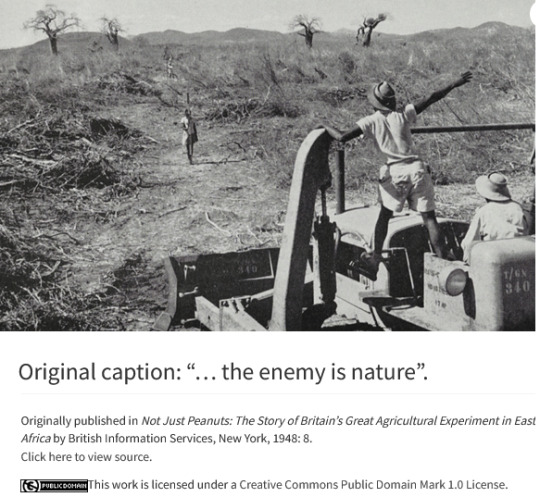
Officials sought to dismiss concerns that large-scale bush clearing would have wider environmental consequences, using the well-worn colonial trope that any observed changes in local climate or erosion patterns were due to the “primitive” agricultural practices of the locals, not to the earth-moving practices of the colonists.
Albert Walter, who had directed meteorology in East Africa since the 1920s, had been appointed as an advisor to the scheme and warned the other technical advisers of the low rainfall levels. [...] As the plants continued to wilt in the sun, Walter’s dense network of rain gauges made for an ideal field laboratory [...].
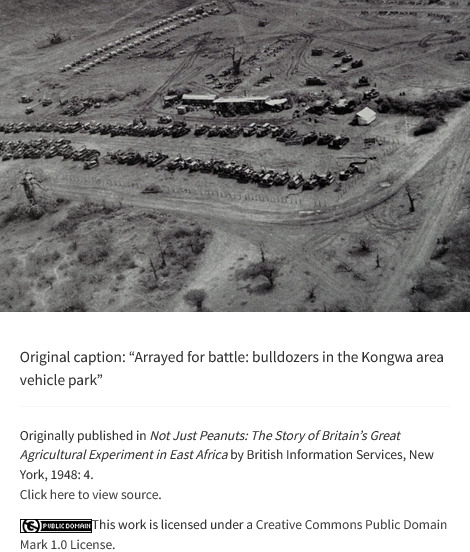
The stakes were high. As John Rosa of the Colonial Development Corporation put it in a letter: “Our standing as an Imperial power in Africa is to a substantial extent bound up with the future of this scheme. To abandon it would be a humiliating blow to our prestige everywhere.”
The only option left was to try and bend the weather itself to the scheme’s will, by seeding the clouds for rain. The scheme was nonetheless abandoned by the British government before charcoal burners could be lined up to seed clouds upwind of the growing area. But the experiments carried on under the aegis of the local colonial government and its meteorologists.
“Balloon bombs” (photographic film canisters tethered to weather balloons) and a repurposed Royal Navy flare gun were used to target individual clouds when the burners proved imprecise. [...] The rainmaking experiments lived on too, as a reference point for those who, to this day, seek to engineer the skies.
The scheme itself has survived as a cautionary tale of governmental hubris, but it is instructive too as a case study of how technologies of war have been turned against other foes.
---
All images, captions, and text by: Martin Mahony. “The Enemy is Nature: Military Machines and Technological Bricolage in Britain’s ‘Great Agricultural Experiment.’“ Environment and Society Portal, Arcadia no. 11. Rachel Carson Center for Environment and Society. Spring 2021. [Bold emphasis and some paragraph breaks/contractions added by me.]
91 notes
·
View notes
Text
“By the 1830s many of women’s traditional economic tasks were being taken over by the factory system. True, they were freed from some of their old oppressive jobs. Yet the incipient industrialization of the economy was simultaneously eroding women’s prestige in the home—a prestige based on their previously productive and absolutely essential domestic labor. Their social status began to deteriorate accordingly. An ideological consequence of industrial capitalism was the shaping of a more rigorous notion of female inferiority. It seemed, in fact, that the more women’s domestic duties shrank under the impact of industrialization, the more rigid became the assertion that “woman’s place is in the home.”
― Angela Y. Davis, Women, Race & Class
150 notes
·
View notes
Text
Okay so I'm gonna go ahead and put a disclaimer up top that these are the ramblings of a dilettante that shouldn't be taken too seriously, but I think that people (understandably) frustrated with with the ICJ ruling and convinced it will have no material consequences should consider some things before they say that.
The first thing I want to remind everyone is that the west is far from invincible. Their rule is not iron-clad and their ability to enforce their will on the world is far from complete and is waning apace.
I think a lot about how in the process of the transition to late capitalism (as I personally define it), one consequence of the mass financialization of the economy is the pricing-out of most common consumer commodity-based manufacturing enterprise in favor of transactions that are most elastic in price, and how the result of that is a mass outflow of raw productive capacity from the imperial core to the global periphery.
If I can frame that in another way, and forgive me in framing this in very neutral terms, but it turns these countries from production-rich countries to production-poor countries with economies defined by the phenomenon of asset-price inflation.
The resulting global situation is that, similar to the assertion that Africa for example is rich because it's where the natural resources that facilitate the global economy are located, Mexico is rich. Vietnam is rich. Bangladesh is rich. These countries are awash in raw capacity to create goods that have a use value. What is the one thing that keeps them relatively cash-poor?
That is, the law. There's a bit of poetry in the idea that just as how within imperial core economies the most important economic instruments are legal contracts to either some percentage of a company's equity or its debt, what sustains its (nominal) riches over the global periphery is a legal regime of ownership that entitles them to the rights to all of the profits going on in these incredibly production-rich countries in the Global South.
It is absolutely correct to say that at the highest level, these legal regimes are enforced at the barrel of the gun, we've seen how too much refusal to to honor these laws by heads of state can lead to mass disinvestment and eventually coups d'état, and even now it would not be a good idea to say, seize the productive assets of a bunch of US firms.
However, and this is where the ICJ comes back in to my point, let's not think about the US. Let's think about, for example, the Netherlands or Belgium. These countries maintain fantastic financial wealth via contracts of ownership with countries in the global south but they are also small and geopolitically unimportant, with little in the way of individual military power.
For little countries like these, genuinely the Only thing that secures their ability to act as a parasite on the global productive economy is the strength of legitimacy that international law affords them, and the position of overwhelming power the west Once had, decades ago.
But the power and prestige of the West continues, as I said, to wane apace. it's too early to happen now but these less militaristic countries are aware of how exposed their assets are to simple seizure if over time international law comes to be seen as a joke.
As awful and condamnable as the current global system is, it is not total dictatorship. It is only able to perpetuate itself because the overwhelming majority of countries that are parties to it have buy in and because, albeit much more slowly than they could have under socialism, they have been able to make dents in their own poverty with it.
The exposure of the international law framework as having absolutely no legitimacy, as being a naked tool of domination of rich countries over poor countries has knock-on effects that stand to be incredibly dangerous to less militarily capable countries that rely on them for their economic structures. On a long-term scale, especially as these countries become richer and more geopolitically influential in their own right, they may well begin to pose the question: why Shouldn't I seize these french factories in my country? Why Shouldn't I seize this Belgian-owned diamond mine? Why Should I pay back this IMF loan, if the ICJ framework can't even compel the Zionist Enemy to end a genocide? And I promise you, this is a reality of which at least some people in those countries are highly cognizant and wary, so I'd wait and see a bit before being Too pessimistic.
40 notes
·
View notes
Text
i cannot for the life of me remember who made that post with the headcanon about the black family losing a lot of their wealth.
but i've been thinking about it a lot. and in england from early to mid 1900s, the aristocracy changed fundamentally as a class, they lost a lot of their previous held power as well as a lot of their money. and because of this, they either had to get a job (the aristocracy is the leisure class. they don't work), which means leaving behind the traditions of your class and your family in order to modernise and keep your money/power, or they could sell off their large estates/lands/artworks in order to keep tradition of the aristocracy as much as they could, but it meant losing a lot of money/power.
there's this quote describing this change in the aristocracy actually- "less power, more prestige". in staying with the traditions of old money, they lose the power they had in government/economy/whatever, but gain lots of admiration and respect from society- like they still have honour and integrity despite losing their money and power, which then becomes their primary tool in still being seen as an influential family.
and with the black family being known as "the noble and most ancient house of black", that definitely could show they chose that pathway. they're clinging onto their lineage of nobility in a time when the aristocracy as a class and the idea of high society is very much falling apart. and unlike quite a lot of these families, they don't modernise but instead keep their heads high and very much make it known that they are nobility and an ancient family, and have no intentions of disrupting this and losing the meaning of what being an aristocrat and a noble used to mean.
#also their motto being “always pure”. like i know its about purebloods and shit#but i do think there's an element of clinging onto traditions#in early 1900s was the rise of celebrities (actors/musicians/writers) surpassing a lot of religious or noble figures in pop culture#and then aristocracts then began to marry these sort of new money celebrities (although not all of them new money#i just mean not following traditions of high society and upper class#and the always pure motto could be very much a clear statement of outrage at this. of class becoming less about lineage#and more about who's the got the bigger wallets and the better parties#sorry i'm doing a module in uni rn about the monarchy and the british classes in early to mid 1900s soo#marauders era#marauders#the black family#the noble and most ancient house of black
37 notes
·
View notes
Text
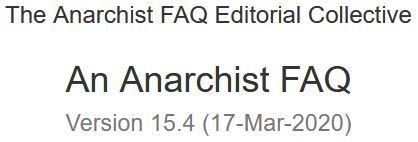
A.2.8 Is it possible to be an anarchist without opposing hierarchy?
No. We have seen that anarchists abhor authoritarianism. But if one is an anti-authoritarian, one must oppose all hierarchical institutions, since they embody the principle of authority. For, as Emma Goldman argued, “it is not only government in the sense of the state which is destructive of every individual value and quality. It is the whole complex authority and institutional domination which strangles life. It is the superstition, myth, pretence, evasions, and subservience which support authority and institutional domination.” [Red Emma Speaks, p. 435] This means that “there is and will always be a need to discover and overcome structures of hierarchy, authority and domination and constraints on freedom: slavery, wage-slavery [i.e. capitalism], racism, sexism, authoritarian schools, etc.” [Noam Chomsky, Language and Politics, p. 364]
Thus the consistent anarchist must oppose hierarchical relationships as well as the state. Whether economic, social or political, to be an anarchist means to oppose hierarchy. The argument for this (if anybody needs one) is as follows:
“All authoritarian institutions are organised as pyramids: the state, the private or public corporation, the army, the police, the church, the university, the hospital: they are all pyramidal structures with a small group of decision-makers at the top and a broad base of people whose decisions are made for them at the bottom. Anarchism does not demand the changing of labels on the layers, it doesn’t want different people on top, it wants us to clamber out from underneath.” [Colin Ward, Anarchy in Action, p. 22]
Hierarchies “share a common feature: they are organised systems of command and obedience” and so anarchists seek “to eliminate hierarchy per se, not simply replace one form of hierarchy with another.” [Bookchin, The Ecology of Freedom, p. 27] A hierarchy is a pyramidally-structured organisation composed of a series of grades, ranks, or offices of increasing power, prestige, and (usually) remuneration. Scholars who have investigated the hierarchical form have found that the two primary principles it embodies are domination and exploitation. For example, in his classic article “What Do Bosses Do?” (Review of Radical Political Economy, Vol. 6, No. 2), a study of the modern factory, Steven Marglin found that the main function of the corporate hierarchy is not greater productive efficiency (as capitalists claim), but greater control over workers, the purpose of such control being more effective exploitation.
Control in a hierarchy is maintained by coercion, that is, by the threat of negative sanctions of one kind or another: physical, economic, psychological, social, etc. Such control, including the repression of dissent and rebellion, therefore necessitates centralisation: a set of power relations in which the greatest control is exercised by the few at the top (particularly the head of the organisation), while those in the middle ranks have much less control and the many at the bottom have virtually none.
Since domination, coercion, and centralisation are essential features of authoritarianism, and as those features are embodied in hierarchies, all hierarchical institutions are authoritarian. Moreover, for anarchists, any organisation marked by hierarchy, centralism and authoritarianism is state-like, or “statist.” And as anarchists oppose both the state and authoritarian relations, anyone who does not seek to dismantle all forms of hierarchy cannot be called an anarchist. This applies to capitalist firms. As Noam Chomsky points out, the structure of the capitalist firm is extremely hierarchical, indeed fascist, in nature:
“a fascist system… [is] absolutist — power goes from top down … the ideal state is top down control with the public essentially following orders.
“Let’s take a look at a corporation… [I]f you look at what they are, power goes strictly top down, from the board of directors to managers to lower managers to ultimately the people on the shop floor, typing messages, and so on. There’s no flow of power or planning from the bottom up. People can disrupt and make suggestions, but the same is true of a slave society. The structure of power is linear, from the top down.” [Keeping the Rabble in Line, p. 237]
David Deleon indicates these similarities between the company and the state well when he writes:
“Most factories are like military dictatorships. Those at the bottom are privates, the supervisors are sergeants, and on up through the hierarchy. The organisation can dictate everything from our clothing and hair style to how we spend a large portion of our lives, during work. It can compel overtime; it can require us to see a company doctor if we have a medical complaint; it can forbid us free time to engage in political activity; it can suppress freedom of speech, press and assembly — it can use ID cards and armed security police, along with closed-circuit TVs to watch us; it can punish dissenters with ‘disciplinary layoffs’ (as GM calls them), or it can fire us. We are forced, by circumstances, to accept much of this, or join the millions of unemployed… In almost every job, we have only the ‘right’ to quit. Major decisions are made at the top and we are expected to obey, whether we work in an ivory tower or a mine shaft.” [“For Democracy Where We Work: A rationale for social self-management”, Reinventing Anarchy, Again, Howard J. Ehrlich (ed.), pp. 193–4]
Thus the consistent anarchist must oppose hierarchy in all its forms, including the capitalist firm. Not to do so is to support archy — which an anarchist, by definition, cannot do. In other words, for anarchists, ”[p]romises to obey, contracts of (wage) slavery, agreements requiring the acceptance of a subordinate status, are all illegitimate because they do restrict and restrain individual autonomy.” [Robert Graham, “The Anarchist Contract, Reinventing Anarchy, Again, Howard J. Ehrlich (ed.), p. 77] Hierarchy, therefore, is against the basic principles which drive anarchism. It denies what makes us human and “divest[s] the personality of its most integral traits; it denies the very notion that the individual is competent to deal not only with the management of his or her personal life but with its most important context: the social context.” [Murray Bookchin, Op. Cit., p. 202]
Some argue that as long as an association is voluntary, whether it has a hierarchical structure is irrelevant. Anarchists disagree. This is for two reasons. Firstly, under capitalism workers are driven by economic necessity to sell their labour (and so liberty) to those who own the means of life. This process re-enforces the economic conditions workers face by creating “massive disparities in wealth … [as] workers… sell their labour to the capitalist at a price which does not reflect its real value.” Therefore:
“To portray the parties to an employment contract, for example, as free and equal to each other is to ignore the serious inequality of bargaining power which exists between the worker and the employer. To then go on to portray the relationship of subordination and exploitation which naturally results as the epitome of freedom is to make a mockery of both individual liberty and social justice.” [Robert Graham, Op. Cit., p. 70]
It is for this reason that anarchists support collective action and organisation: it increases the bargaining power of working people and allows them to assert their autonomy (see section J).
Secondly, if we take the key element as being whether an association is voluntary or not we would have to argue that the current state system must be considered as “anarchy.” In a modern democracy no one forces an individual to live in a specific state. We are free to leave and go somewhere else. By ignoring the hierarchical nature of an association, you can end up supporting organisations based upon the denial of freedom (including capitalist companies, the armed forces, states even) all because they are “voluntary.” As Bob Black argues, ”[t]o demonise state authoritarianism while ignoring identical albeit contract-consecrated subservient arrangements in the large-scale corporations which control the world economy is fetishism at its worst.” [The Libertarian as Conservative, The Abolition of Work and other essays, p. 142] Anarchy is more than being free to pick a master.
Therefore opposition to hierarchy is a key anarchist position, otherwise you just become a “voluntary archist” — which is hardly anarchistic. For more on this see section A.2.14 ( Why is voluntarism not enough?).
Anarchists argue that organisations do not need to be hierarchical, they can be based upon co-operation between equals who manage their own affairs directly. In this way we can do without hierarchical structures (i.e. the delegation of power in the hands of a few). Only when an association is self-managed by its members can it be considered truly anarchistic.
We are sorry to belabour this point, but some capitalist apologists, apparently wanting to appropriate the “anarchist” name because of its association with freedom, have recently claimed that one can be both a capitalist and an anarchist at the same time (as in so-called “anarcho” capitalism). It should now be clear that since capitalism is based on hierarchy (not to mention statism and exploitation), “anarcho”-capitalism is a contradiction in terms. (For more on this, see Section F)
#faq#anarchy faq#revolution#anarchism#daily posts#communism#anti capitalist#anti capitalism#late stage capitalism#organization#grassroots#grass roots#anarchists#libraries#leftism#social issues#economy#economics#climate change#climate crisis#climate#ecology#anarchy works#environmentalism#environment#solarpunk#anti colonialism#mutual aid#cops#police
31 notes
·
View notes
Text
every time something fucking happens in baltimore people come out of the woodwork to talk about the fucking wire.
the wire didn't happen. the wire isn't real. if that's the only thing you can think of when you think of baltimore, please get fucked immediately.
people are going to hurt badly because of this bridge collapse. the economy of this already struggling city is going to take a hit. if you want to talk about a prestige tv show from 22 years ago instead of the issue, please reconsider your choices and stay the fuck away from me
29 notes
·
View notes
Text
with another slew of announcements from netflix and hbo max about show cancelations got me thinking about that “why do folks like BL” post again where someone mentioned that the dramas are one-and-done’s and like, I think that’s why people are gravitating towards kdramas and cdramas too
like, you can watch all of Love Between Fairy and Devil and be satisfied, it’s a one-and-done, you can watch Bad Buddy and be happy, you don’t need a season two for My Name, or Extraordinary Attorney Woo, or even Squid Game, special episodes for Cutie Pie or Love in the Air are nice but not required, shit’s done, it’s completed, finito
a season two or a special episode is nice, but it’s either an extra or a continuation. Like yeah you CAN watch TharnType 7 Years of whatever the fuck, but you don’t HAVE too and still get a full story outta TharnType. No one is suddenly not going to understand Love in the Air if they don’t watch the special episode. Yeah it’d be cool to have a second season of My Name but it doesn’t HAVE to happen b/c the story wraps up at the end.
American television doesn’t work like that and honestly it’s getting fucking annoying b/c streaming services just cancel shit whenever the mood~~ strikes them. Netflix has been notorious for cancelling shows after 3 seasons b/c like a kpop contract the original show contract is up for re-negotiation and Netflix doesn’t wanna pay ppl more (corporations caring about people? in this economy??)
now with the merger of Discovery and Warner Bros it’s freaking Hostel up at HBO Max, shows getting axe murdered left, right, and center sometimes while still in post-production. It’s wild and it blows like fuck why bother getting invested in anything??? I was curious about watching Half Bad but the show got axed after one season so like, why even bother watching an incomplete story???
The only shows that seem guaranteed for continuation are if they’re juggernauts like Euphoria, Stranger Things, Game of Thrones spin offs, Star Wars and Marvel or prestige award shows (like Succession and White Lotus)
so yeah I end up watching a lot of international media b/c at least shit is finished and not a half-baked cake
#chaos pikachu talks to damn much#the only reason I still have netflix is b/c it's the most accessible place for international media#cause i hate watching shit on a laptop
366 notes
·
View notes